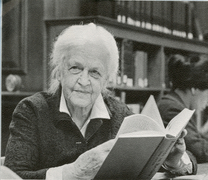Eva Judd O’Meara: A Music Librarian in a New Profession
Richard Boursy
Thursday, July 13, 2017

The series RISM A–Z brings us to the letter O, which today stands for Eva Judd O’Meara. Miss O’Meara is the first music librarian that features in our series. Richard Boursy, archivist at the Gilmore Music Library, Yale University, tells us about the life and career of someone who was notable for a number of firsts:Yale University’s first music librarian, one of the “founding parents” of the Music Library Association, and the first editor of Notes._
Eva Judd O’Meara (1884-1979) did not take the conventional road to a career in music librarianship. She had no musical training, she lacked a college degree, and she became a music librarian by accident. But it was not just a matter of being in the right place at the right time; her keen intelligence, tireless labor, and exceptional organizational skills enabled her to build one of the world’s great music libraries and become a central figure in a new profession.
Born in the small town of Seymour, Connecticut, O’Meara was educated in the local public school system, and worked in the public libraries of Seymour and nearby Derby. In 1908 she moved to Montreal, where she worked first at McGill University, and then in the private library of a McGill dean. After six years in Canada, O’Meara returned to her home state to accept a cataloging job at Yale University.
Exactly a century ago, in 1917, Yale built a new home for its School of Music. Sprague Hall, as it was called, included one room for a library. O’Meara’s cataloging responsibilities had included music, so she was assigned to the Music Library for a few months, to get it started. From then on, it was assumed, the library could be managed entirely by students. That plan was obviously unrealistic, and after returning to her former duties in the University Library, O’Meara continued to oversee the Music Library in her spare time. In 1924, she was finally appointed on a full-time basis.
Yale’s new Music Library united three music collections that had previously been separate: the School of Music’s library (which was small and meant for practical use), music materials from the University Library (which included the major Gesamtausgaben), and the Lowell Mason Library. The last of these is of special interest to RISM users. Mason (1792-1872) became wealthy from his work as a music editor and educator, and he spent much of his money on music; his library eventually comprised more than ten thousand manuscripts and rare published works. After his death, his family gave it to Yale. Mason’s library was especially strong in German baroque music, in part because he had purchased the impressive collection of J.C.H. Rinck (1770-1846), who had ties to J.S. Bach’s circle.
Working closely with the faculty, O’Meara identified and filled gaps in the Music Library’s holdings, and she enhanced its special collections with some important acquisitions. She pioneered the library’s program of archival collecting when she acquired the papers of Horatio Parker (1863-1919), Dean of the School of Music. Her most celebrated acquisition, though, was the Clavier-Büchlein vor Wilhelm Friedemann Bach, a book-length manuscript that J.S. Bach compiled for the education of his son.
In 1931 the American Library Association held its conference in New Haven. O’Meara and several of her counterparts from other institutions came together at that time to establish the Music Library Association. In 1934 she became the first editor of the MLA’s new journal, Notes. She later chaired the committee that wrote the ALA cataloging code for music.
O’Meara taught one of the first courses in music bibliography, and she published many articles on library matters. Her writing was always graceful and erudite, and sometimes witty.
O’Meara officially retired in 1952, but she continued to work on library projects for the next quarter century; she was seen carrying a portable typewriter to her carrel in the stacks each day when she was well into her nineties. Just three weeks before her death in 1979, she spoke to an MLA chapter meeting in New Haven, offering her recollections of the founding of the MLA and the acquisition of the Clavier-Büchlein. O’Meara’s papers include a cassette recording of that talk.
Despite her lack of formal education, O’Meara earned the respect and admiration of those who knew her, even renowned Yale professors such as Paul Hindemith and Ralph Kirkpatrick, both of whom were not easily impressed. In 1965, the MLA gave O’Meara a Citation and Honorary Membership. The award for the best review in Notes is named after her. Yale honored her with a medal from the Friends of Music (1975), and an endowment established in her name still helps support what is now known as the Irving S. Gilmore Music Library.
Photograph of O’Meara courtesy of the Irving S. Gilmore Music Library, Yale University, and used with kind permission.
Share Tweet EmailCatégorie: RISM A-Z

